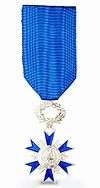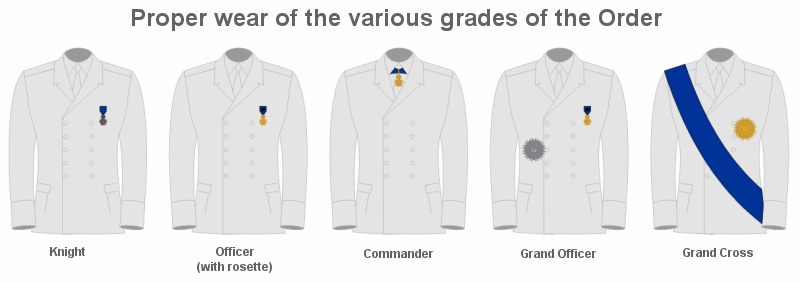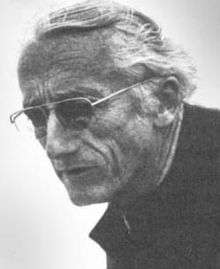National Order of Merit (France)
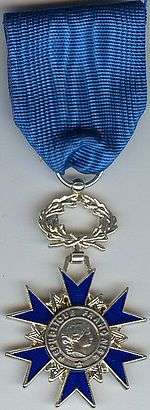
Knight of the Order

Star and riband of a Grand-Croix
The National Order of Merit (French: Ordre national du Mérite) is a French order of merit with membership awarded by the President of the French Republic, founded on 3 December 1963 by President Charles de Gaulle. The reason for the order’s establishment was twofold: to replace the large number of ministerial orders previously awarded by the ministries; and to create an award that can be awarded at a lower level than the Legion of Honour, which is generally reserved for French citizens.[1] It comprises about 187,000 members worldwide.
History
Defunct ministerial orders
The National Order of Merit replaced the following ministerial and colonial orders:[1]
Colonial orders
Special ministerial orders of merit
- Ordre du Mérite social (Order of Societal Merit) (1936)
- Ordre de la Santé publique (Order of Public Health) (1938)
- Ordre du Mérite commercial et industriel (Order of Commercial and Industrial Merit) (1939)
- Ordre du Mérite artisanal (Order of Artisanal Merit) (1948)
- Ordre du Mérite touristique (Order of Tourism Merit) (1949)
- Ordre du Mérite combattant (Order of Combatant Merit) (1953)
- Ordre du Mérite postal (Postal Order of Merit) (1953)
- Ordre de l'Économie nationale (Order of the National Economy) (1954)
- Ordre du Mérite sportif (Order of Sports Merit) (1956)
- Ordre du Mérite du travail (Order of Work Merit) (1957)
- Ordre du Mérite militaire (Order of Military Merit) (1957)
- Ordre du Mérite civil (Order of Civil Merit) (1957)
- Ordre du Mérite Saharien (Order of Saharan Merit) (1958)
Organisation
Statutes
French citizens as well as foreign nationals, men and women, can be received into the order for distinguished military or civil achievements, though of a lesser level than that required for the award of the Legion of Honour. The President of the French Republic is the Grand Master of the order and appoints all its members by convention on the advice of the Government of France. The order has a common Chancellor and Chancery with the Legion of Honour. Every Prime Minister of France is made a Grand cross of the order after 24 months of service.[1]
Ranks
The Order has five classes, the same as the Légion d’honneur:[1]
- Chevalier (Knight): to be of a minimum age of 35, have a minimum of 10 years of public service (although, in practice, 15 years is the minimum commonly needed to be conferred the rank of Chevalier), and "distinguished merits" (for active duty commissioned officers, this is achieved after fifteen years of meritorious service)
- Officier (Officer): minimum of 5 years in the rank of Chevalier (for active duty commissioned officers, this is achieved after seven years in the rank of Chevalier)
- Commandeur (Commander): minimum of 5 years in the rank of Officier (for active duty commissioned officers, this is achieved after five years the rank of Officier)
- Grand Officier (Grand Officer): minimum 3 years in the rank of Commandeur
- Grand-Croix (Grand Cross): minimum 3 years in the rank of Grand Officier
Insignia
- Grand-Croix - wears the badge on a sash on the right shoulder, plus the star on the left chest;
- Grand Officier - wears the badge on a ribbon with rosette on the left chest, plus the star on the right chest;
- Commandeur - wears the badge on a ribbon around the neck;
- Officier - wears the badge on a ribbon with rosette on the left chest;
- Chevalier - wears the badge on a ribbon on the left chest.
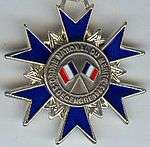
Reverse of the Knight's insignia of the Order
The medal and the plaque of the Order were designed by the French sculptor Max Leognany.[1]
- The medal of the order is a six-armed Maltese asterisk in gilt (silver for chevalier) enamelled blue, with laurel leaves between the arms. The obverse central disc features the head of Marianne, surrounded by the legend République française (French Republic). The reverse central disc has a set of crossed tricolores, surrounded by the name of the order and its foundation date. The badge is suspended by a laurel wreath.
- The star (plaque) is worn by Grand-Croix (in gilt on the left breast) and Grand Officier (in silver on the right breast) respectively; it is a twelve-armed sunburst, with rays (formerly plain, now in blue enamel) between the arms. The central disc features the head of Marianne, surrounded by the legend République française and the name of the Order, and in turn surrounded by a wreath of laurel.
- The ribbon for the medal is a solid blue field. For the grade of Officier and above, a rosette is centered in the field. For the grades of Commandeur, Grand Officier, and Grand-Croix, the rosette is centered bar of silver; silver and gold, and a solid gold respectively.
| Undress ribbons |
|---|
| Chevalier |
Officier |
Commandeur |
Grand Officier |
Grand-Croix |
|
Notable recipients
The individuals listed below have been admitted as members of the National Order of Merit:
French citizens
- Jean-Paul Belmondo, actor
- René Clair, writer and filmmaker
- Jacques Cousteau, oceanographer
- Jean Delay, psychiatrist and author
- José-Alain Sahel, ophtholmologist and scientist
- President Charles de Gaulle, statesman
- Jean-Marc de La Sablière, diplomat
- Alain Delon, actor
- Gérard Depardieu, actor and filmmaker
- Laurent Fabius, politician
- Erol Gelenbe, computer scientist
- Isabelle Huppert, actress
- Patrick Kron, corporate executive
- General André Lalande, military officer
- Robert Lecou, politician
- Thierry Lhermitte, actor and comedian
- Marcel Marceau, actor and mime
- Frédéric Mazzella, entrepreneur[2]
- President François Mitterrand, statesman
- Madeleine Riffaud, poet and war correspondent
- Jean-Pierre Rives, sculptor
- Sylvie Vartan, singer
|
Foreign nationals
- Teguest Yilma, Managing Director Capital News Paper (Ethiopia)
- Dr Prins Nevhutalu Vice-Chancellor of the Cape Peninsula University of Technology
- Queen Aishwarya of Nepal
- Tina Arena, musician and actress (Australia)
- Sir John Barbirolli, conductor and cellist (UK)
- Jovanka Broz, First Lady of Yugoslavia
- General Wesley Clark, military officer (USA)
- Felix Ermacora, politician and expert on human rights (Austria)
- Sivaji Ganesan, actor (India)
- King Gyanendra of Nepal
- Bruce Jackson, writer and photographer (USA)
- General James L. Jones USMC, military officer and diplomat (USA)
- King Juan Carlos I of Spain
- Queen Komal of Nepal
- Roméo LeBlanc, journalist and statesman (Canada)
- John McManners, clergyman and historian (UK)
- Villoo Morawala-Patell, corporate executive (India)
- Léopold Sédar Senghor, poet, politician and cultural theorist (Senegal)
- Admiral Sumner Shapiro, USN, intelligence officer
- Queen Sonja of Norway
- Dubravka Stojanović, historian, Serbia
- Surya Bahadur Thapa, Prime Minister of Nepal
- Raja M. Kausalya Devi, The Honorary Consul of France in Chennai, India
- Marshal Josip Broz Tito, statesman (Yugoslavia)
- Princess Galyani Vadhana, Princess of Naradhiwas (Thailand)
- King Willem-Alexander of the Netherlands
- Queen Máxima of the Netherlands
- Camilla, Duchess of Cornwall (UK)
- Capt. John Colin Rye, R.A. - M.D. of Compagnie Française de l'Afrique Occidentale, U.K. Branch.(UK)
- Dr. Jamal Sanad Al-Suwaidi
- General Anthony Zinni USMC, military officer (USA)
- Ignacio Fernández Toxo, President of ETUC (Spain)
- Njoroge Mungai, Cabinet Minister for Foreign Affairs and Businessman (Kenya)
- Mazen al-Sawwaf, Businessman (Kingdom of Saudi Arabia)
- Nasser Kamel, Ambassador of Egypt to France (2006-2012)
- Kamal Hassan, actor (India)
- T. K. Ann, industrialist, legislator and sinologist (Hong Kong)
- Ángel Barraza del Toro, attache to the Mexican embassy in France (1974-1976)
|
| Actor, director and writer Jacques Weber, a Chevalier of the Ordre national du Mérite. |
| US Navy Admiral Frank Bowman, an Officier of the Ordre national du Mérite |
|
See also
References
Sources
External links
|
|---|
|
| Orders | |
|---|
|
Civilian
decorations | |
|---|
|
Military
decorations | |
|---|
|
| Other | |
|---|
|
Commemorative
medals | 19th
century | |
|---|
| 1900–1914 | |
|---|
| | |
|---|
| Interwar Period
1918–1939 | |
|---|
| | |
|---|
| Since 1945 | |
|---|
|
|---|
|
Defunct
orders | |
|---|
|
- No longer awarded.
- No longer awarded, no living recipient
-
 France portal France portal
|
